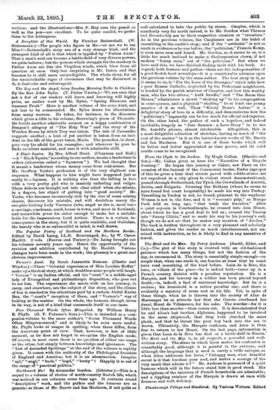The Mask and the Man. By Percy Andreae. (Smith, Elder,
and Co.)—The plot of this story is evolved with an old-fashioned patience which has many things, but not the fashion of the day, to recommend it. The story is essentially simple enough—so simple that, when one reads it, one fancies at least that he must have read something of the kind before. Leon de la Rive, the hero, or villain of the piece—he is indeed both—turns up in a French country district with a peculiar reputation. He is a Marquis, and his bravery as a soldier has been placed beyond doubt,—is, indeed, a fact of universal knowledge. But he is a recluse ; his household is a rather peculiar one ; and there is evidently a mystery of some sort in his life. Yet, in spite of these things, when he is thrown into the society of Alice de Marsa,nges he so attracts her that she throws overboard her fiancé, Henri de Villeneuve, for his sake. The murder—for it is little less than murder—then comes out. It is demonstrated that he and Alice's lost brother, Alphonse, happened to be involved in the same shipwreck, that they both clutched the same plank, and that he thrust the poor boy back into the sea to drown. Ultimately, the Marquis confesses, and Alice is thus free to return to her Henri. On the last page, information is given that Leon de la Rive has died on a battle-field in Russia.' The Mask and the Man is, in all respects, a powerful and well. written story. The siene in which Leon makes his confession is remarkably good, although it is painful in the extreme, and although the language that is used is surely a trifle antique, as when Alice addresses her lover, "Unhappy man, what dreadful secret is it that burdens your soul, and makes a scourge of the very merit that adorns it ? " Mr. Andreae is possessed of a quiet humour which will in the future stand him in good stead. His descriptions of the interiors of French households are admirable ; and a tippling retainer of the Marquis is drawn at once with firmness and with delicacy.






































 Previous page
Previous page